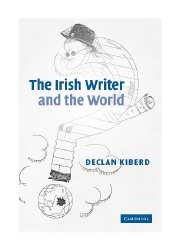Book contents
- Frontmatter
- Contents
- Acknowledgements
- A note on the text
- 1 Introduction
- 2 The fall of the Stage Irishman (1979)
- 3 Storytelling: the Gaelic tradition (1978)
- 4 Writers in quarantine? The case for Irish Studies (1979)
- 5 Synge, Yeats and bardic poetry (2002)
- 6 George Moore's Gaelic lawn party (1979)
- 7 The flowering tree: modern poetry in Irish (1989)
- 8 On national culture (2001)
- 9 White skins, black masks: Celticism and Négritude (1996)
- 10 From nationalism to liberation (1997)
- 11 The war against the past (1988)
- 12 The Elephant of Revolutionary Forgetfulness (1991)
- 13 Reinventing England (1999)
- 14 Museums and learning (2003)
- 15 Joyce's Ellmann, Ellmann's Joyce (1999)
- 16 Multiculturalism and artistic freedom: the strange death of Liberal Europe (1993)
- 17 The Celtic Tiger: a cultural history (2003)
- 18 The city in Irish culture (2002)
- 19 Strangers in their own country: multiculturalism in Ireland (2001)
- Index
17 - The Celtic Tiger: a cultural history (2003)
Published online by Cambridge University Press: 22 September 2009
- Frontmatter
- Contents
- Acknowledgements
- A note on the text
- 1 Introduction
- 2 The fall of the Stage Irishman (1979)
- 3 Storytelling: the Gaelic tradition (1978)
- 4 Writers in quarantine? The case for Irish Studies (1979)
- 5 Synge, Yeats and bardic poetry (2002)
- 6 George Moore's Gaelic lawn party (1979)
- 7 The flowering tree: modern poetry in Irish (1989)
- 8 On national culture (2001)
- 9 White skins, black masks: Celticism and Négritude (1996)
- 10 From nationalism to liberation (1997)
- 11 The war against the past (1988)
- 12 The Elephant of Revolutionary Forgetfulness (1991)
- 13 Reinventing England (1999)
- 14 Museums and learning (2003)
- 15 Joyce's Ellmann, Ellmann's Joyce (1999)
- 16 Multiculturalism and artistic freedom: the strange death of Liberal Europe (1993)
- 17 The Celtic Tiger: a cultural history (2003)
- 18 The city in Irish culture (2002)
- 19 Strangers in their own country: multiculturalism in Ireland (2001)
- Index
Summary
Charles Stewart Parnell, the great man whom we commemorate here, was a believer in an inclusive, agreed nation: ‘we cannot afford to lose a single Irishman’ was a favourite rallying cry. Another was his call, repeated on occasions when things seemed to be going wrong, that ‘we must resign ourselves to the cursed versatility of the Celt’. Perhaps this was just a colourful version of the better-known English political mantra to account for the inevitable frustration of plans – ‘events, dear boy, events’ – but I like to think that Parnell in those cryptic sentences was proclaiming the link between the ideal of a pluralist nation on the one hand and the expressive potential of the individual on the other. In the very year of Parnell's death, after all, Oscar Wilde straight-facedly told his disciples that the only way to intensify personality was to multiply it.
That, for me, is the true significance of Parnell's career – that he opened up a debate about cultural sovereignty. Although the yearnings which he articulated seemed solely political in their language, they were also implicitly cultural: he wished for a form of sovereignty in the cultural domain so that Irish people might once again become interesting and metropolitan to themselves. The poet W. B. Yeats had the shrewdness to sense this point: in his writings Parnell is presented as an image of great conflicting passions marvellously controlled, whether the picture is of Parnell holding Kitty O'Shea over the turbulent sea-waters of Brighton or facing down his enemies at Westminster, the lesson is one of self-conquest, self-command, self-reliance.
- Type
- Chapter
- Information
- The Irish Writer and the World , pp. 269 - 288Publisher: Cambridge University PressPrint publication year: 2005
- 3
- Cited by

